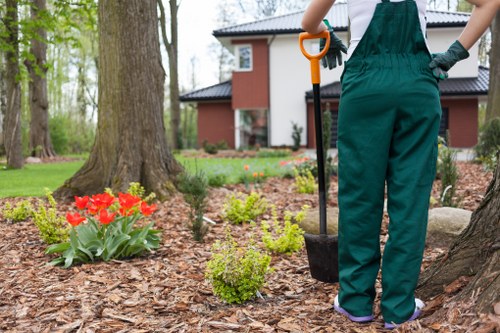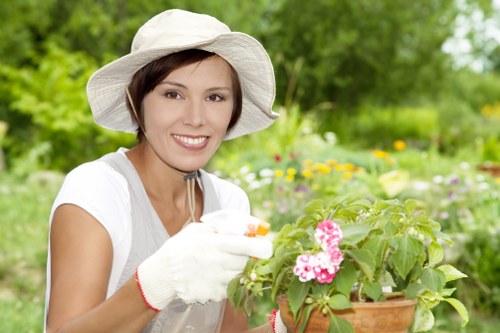Comprehensive Guide to Garden Maintenance in Whitechapel
Introduction to Garden Maintenance

Maintaining a beautiful garden in Whitechapel requires dedication, knowledge, and the right tools. Whether you're a seasoned gardener or a novice, understanding the fundamentals of garden upkeep can transform your outdoor space into a lush, vibrant haven.
Whitechapel's unique climate and soil conditions present specific challenges and opportunities for garden enthusiasts. By tailoring your maintenance practices to these local factors, you can ensure your garden thrives year-round.
In this guide, we will explore essential garden maintenance tips, seasonal tasks, and expert advice tailored to the Whitechapel area, helping you achieve a picturesque and well-maintained garden.
Understanding Whitechapel’s Climate

Whitechapel experiences a temperate maritime climate, characterized by mild winters and cool summers. This climate influences the types of plants that can thrive in the area, as well as the maintenance routines required to keep them healthy.
Rainfall is fairly distributed throughout the year, but certain seasons may require additional watering or drainage solutions to prevent waterlogging. Understanding these patterns helps in selecting appropriate plants and planning your garden layout accordingly.
Additionally, the area's urban environment can affect garden conditions, such as increased pollution or limited sunlight. Taking these factors into account is crucial for effective garden maintenance in Whitechapel.
Essential Garden Tools and Equipment

Having the right tools is fundamental to maintaining a healthy garden. From basic hand tools to more specialized equipment, investing in quality tools can make garden tasks easier and more efficient.
Key tools for garden maintenance in Whitechapel include:
- Pruning shears: For trimming and shaping plants.
- Garden gloves: To protect your hands while working.
- Watering equipment: Such as hoses, sprinklers, or drip irrigation systems.
- Soil testing kits: To monitor pH levels and nutrient content.
Additionally, power tools like lawnmowers and hedge trimmers can save time and labor, especially for larger gardens. Regular maintenance of these tools ensures they remain effective and safe to use.
Plant Selection and Care

Choosing the right plants is a crucial aspect of garden maintenance in Whitechapel. Opting for native or well-adapted species can reduce maintenance efforts and increase the chances of plant success.
Consider plants that are resilient to the local climate and soil conditions. Incorporate a mix of perennials, annuals, shrubs, and trees to create a diverse and balanced garden ecosystem.
Proper care involves regular watering, fertilizing, and pruning. Understanding the specific needs of each plant type ensures they receive the necessary nutrients and care to flourish.
Seasonal Garden Maintenance Tasks

Garden maintenance is a year-round commitment, with each season bringing its own set of tasks. Adapting your maintenance routine to the changing seasons in Whitechapel ensures sustained garden health.
Spring: Focus on planting new growth, pruning shrubs, and preparing the soil. This is also the time to address any winter damage and revive plant health.
Summer: Maintain regular watering schedules, manage weeds, and monitor for pests and diseases. Mulching can help retain moisture and regulate soil temperature.
Autumn: Clean up fallen leaves, plant bulbs for next spring, and protect plants from the upcoming cold. It's also a good time to fertilize and prepare tools for winter storage.
Winter: Focus on tool maintenance, plan for the next gardening season, and protect sensitive plants from frost. Some hardy plants may continue to grow, requiring minimal care.
Pest and Disease Management

Effective pest and disease management is essential for a healthy garden. Whitechapel's climate can attract various pests and create conditions conducive to certain plant diseases.
Implementing integrated pest management (IPM) strategies can help control unwanted pests while minimizing environmental impact. This includes monitoring pest populations, using natural predators, and applying organic treatments when necessary.
Regular inspection of plants allows for the early detection of diseases, making it easier to address issues before they spread. Maintaining good garden hygiene, such as removing diseased plant material, is also crucial.
Soil Health and Fertilization

Healthy soil is the foundation of a thriving garden. In Whitechapel, understanding your soil type and its nutrient content can guide effective fertilization and soil amendment practices.
Conducting regular soil tests helps determine pH levels and identify any nutrient deficiencies. Based on the results, you can add organic matter, compost, or specific fertilizers to enhance soil fertility.
Maintaining soil structure through practices like mulching and cover cropping can improve moisture retention and reduce erosion. Healthy soil promotes robust plant growth and resilience against pests and diseases.
Lawn Care and Maintenance

A well-maintained lawn adds aesthetic value and provides a versatile space for various activities. In Whitechapel, lawn care involves regular mowing, watering, and aerating to keep the grass healthy and lush.
Choosing the right grass type that suits the local climate and soil conditions can reduce maintenance efforts. Perennial grasses are often preferred for their durability and low maintenance requirements.
Proper mowing techniques, such as not cutting the grass too short and varying mowing patterns, promote healthy growth and prevent weed invasion. Regular aeration helps improve soil oxygen levels and drainage, enhancing overall lawn health.
Hardscape Maintenance

Hardscape elements, such as patios, walkways, and fences, require regular maintenance to remain functional and visually appealing. In Whitechapel, protecting these structures from weathering and wear is essential.
Regular cleaning and sealing of surfaces prevent damage from moisture and environmental factors. Inspecting for cracks or structural issues allows for timely repairs, extending the lifespan of hardscape features.
Choosing durable materials that withstand local climate conditions can reduce maintenance frequency and costs. Proper installation and ongoing care ensure that hardscape elements complement the overall garden design.
Water Management Strategies

Effective water management is critical for garden maintenance, particularly in areas like Whitechapel where rainfall patterns can vary. Implementing strategies to optimize water usage ensures plant health and conserves resources.
Installing drip irrigation systems or soaker hoses provides targeted watering, reducing waste and ensuring plants receive adequate moisture. Rainwater harvesting systems can also supplement watering needs, especially during dry periods.
Proper drainage solutions prevent waterlogging and root damage. Creating rain gardens or using permeable paving materials can enhance water absorption and reduce runoff, contributing to a sustainable garden ecosystem.
Benefits of Professional Garden Maintenance

While DIY garden maintenance is rewarding, hiring professional services in Whitechapel can offer numerous advantages. Professional gardeners bring expertise, experience, and efficiency to garden care.
They can provide tailored maintenance plans that address the specific needs of your garden, ensuring optimal plant health and aesthetics. Professionals also have access to specialized tools and materials, enhancing the quality of maintenance tasks.
Additionally, professional services can save you time and effort, allowing you to enjoy your garden without the stress of constant upkeep. Investing in professional maintenance can lead to long-term benefits, including increased property value and a more enjoyable outdoor space.
Eco-Friendly Gardening Practices

Adopting eco-friendly gardening practices contributes to environmental sustainability and enhances the health of your garden. In Whitechapel, integrating sustainable methods can lead to a more resilient and thriving outdoor space.
Key eco-friendly practices include using organic fertilizers, composting garden waste, and selecting native plants that require less water and maintenance. Reducing chemical usage minimizes the impact on local wildlife and promotes a balanced ecosystem.
Implementing mulch and cover crops conserves soil moisture, suppresses weeds, and improves soil health. Sustainable gardening not only benefits your garden but also the broader community by fostering a healthier environment.
Creating a Seasonal Garden Plan

Developing a seasonal garden plan helps organize maintenance tasks and ensures that your garden receives the appropriate care throughout the year. In Whitechapel, aligning your plan with the local climate and seasonal changes maximizes garden productivity and beauty.
A well-structured seasonal plan outlines specific tasks for spring, summer, autumn, and winter. This approach ensures timely planting, pruning, fertilizing, and other essential activities, preventing neglect and promoting continuous garden health.
Utilizing a calendar or gardening journal can help track progress and make adjustments as needed. A seasonal plan also facilitates the integration of new plants and the removal of those that are no longer thriving, maintaining a dynamic and vibrant garden environment.
Enhancing Garden Aesthetics

Aesthetics play a significant role in garden maintenance, influencing how enjoyable and visually appealing your outdoor space is. In Whitechapel, enhancing garden aesthetics involves thoughtful design, plant selection, and decorative elements.
Incorporating a variety of plant textures, colors, and heights creates visual interest and depth. Grouping plants with similar care requirements simplifies maintenance and ensures cohesive growth patterns.
Adding elements such as garden art, lighting, and water features can further enhance the beauty and functionality of your garden. These features provide focal points and can transform your garden into a serene and inviting retreat.
Conclusion and Final Thoughts

Effective garden maintenance in Whitechapel involves a combination of knowledge, planning, and dedicated effort. By understanding the local climate, selecting appropriate plants, and implementing regular maintenance routines, you can cultivate a beautiful and thriving garden.
Whether you choose to maintain your garden yourself or enlist professional services, prioritizing garden care ensures a rewarding and enjoyable outdoor space. Embrace sustainable practices, stay organized with seasonal plans, and continually adapt to your garden's evolving needs.
Start transforming your Whitechapel garden today and enjoy the myriad benefits of a well-maintained, lush green space.
Contact us today to learn more about our professional garden maintenance services in Whitechapel and take the first step towards your dream garden.